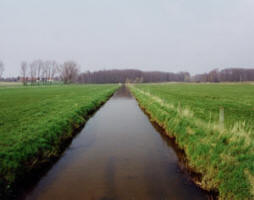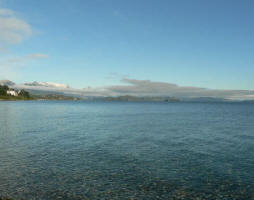 Netherlands Using Big Data to Manage Water
Netherlands Using Big Data to Manage Water
The Netherlands’ new ‘Digital Delta’ project, headed by IBM, will collate vast and currently disparate data sets in order to better manage water resources in the country, The Wall Street Journal reported. The 1-year project aims to improve flood prediction and response, but will also provide an information “platform” for water entrepreneurs and scientists.
Diseases spread by contaminated water sources and poor sanitation are now a concern for India in the aftermath of massive flooding, Reuters reported, citing aid agencies. Heavy rains continue to fall, washing dead animals and corpses into rivers that are being used as water sources.
Digital Delta will investigate how to integrate and analyze water data from a wide range of existing data sources. These include precipitation measurements, water level and water quality monitors, levee sensors, radar data, model predictions as well current and historic maintenance data from sluices, pumping stations, locks and dams.
At Digital Delta's core is an intelligent, cloud-based system built on IBM’s Intelligent Water software and Smarter Water Resource Management solution including consulting expertise.
With 55 percent of the Dutch population located in areas prone to large-scale flooding, the Netherlands has immense experience in preventing floods and managing water. Every water-related event is critical and can impact businesses, agriculture and citizens’ daily lives. The ongoing cost of managing water, including anticipating flooding, droughts and low water levels, adds up to €7 billion each year. These costs are expected to increase €1- 2 billion by 2020, unless urgent action is taken.
The new management system will address concerns ranging from the quality of drinking water to the increasing frequency and impact of extreme weather-related events to the risk not only of floods but also droughts. By modeling weather events, the Netherlands will be able to determine the best course of action including storing water, diverting it from low-lying areas, avoiding saltwater intrusion into drinking water, sewage overflows and water contamination.
The Netherlands has one of the best-monitored water systems in the world. While large amounts of data are collected, relevant data can be difficult to find, data quality can be uncertain and with data in many different formats, this creates costly integration issues for water managing authorities. Solving these Big Data challenges is an important step towards a Smarter Water management approach.
The initiative will provide water experts with a real-time intelligent dashboard to harness information so it can be shared immediately across organizations and agencies. Using data visualization and deep analytics, these insights can help prepare for imminent difficulties, enabling authorities to coordinate and manage response efforts and, over the longer term, to enhance the ongoing efficiency of overall water management. With better integrated information, water authorities will be able to prevent disasters and environmental degradation, while reducing the cost of managing water by up to 15 percent.
“Aggregating, integrating and analyzing data on weather conditions, tides, levee integrity, run off and more, will provide the Dutch government with detailed information that better prepares it to protect Dutch citizens and business, as well as homes, livestock and infrastructure,” said Jan Hendrik Dronkers, Director General of Rijkswaterstaat. “As flooding is an increasing problem in many regions of the world, we hope that the Digital Delta project can serve as a replicable solution for better water management anywhere in the world.”
Together, Rijkswaterstaat, local Water Authority Delfland, Deltares Science Institute, the University of Delft and IBM will combine data and technology from several new and existing water management projects:
- Delft University of Technology will use IBM’s Intelligent Water Software to access weather predictions, real-time sensor data, topography and information about asset service history to make more informed and timely decisions on maintenance schedules to save costs while preventing flooding of tunnels, buildings and streets.
- Rijkswaterstaat and local water authorities will manage water balance data and share the information centrally through the Digital Delta platform, making it possible for the Dutch water system to optimize the discharge of water and improve the containment of water during dry periods, and prevent damage to agriculture.
- HydroLogic Research and IBM together with the Delfland Water Board will develop a scalable early flood warning method, through integration of a large amount of real-time measurement data from the water system as well as weather information and water system simulation models.
- Next Generation Hydro Software facilitates the numerical modeling of rivers, seas and deltas, but requires access to large volumes of data found in multiple formats. The Digital Delta initiative will solve this problem by maintaining a catalogue of frequently used data and converting data formats to a standardized form, providing a unified view of the data needed to make more accurate predictions.
Digital Delta will explore the potential for sharing and managing water data in new ways, using the latest technology and deep industry expertise.
"The implications for this work are global as cities around the world move swiftly to adopt smarter solutions to better manage the water cycle,” said Michael J Dixon, general manager, Global Smarter Cities, IBM. “With this innovative collaboration, IBM is setting a worldwide example using the power of Big Data, analytics and optimization to better manage water quality, flood risk and drought impact, while also stimulating new innovations in this crucial area of technology."
--
Water Supply
Desalination may offer a solution to the growing water crisis in Gaza, where more than 90 percent of the underlying aquifer is contaminated, but funding issues make the technology an uncertain option, Reuters reported. Small desalination units currently provide water for 20 percent of the population.
Five cities in southern California, including Los Angeles, plan to cut their collective water imports by more than 150 billion liters (40 billion gallons) each year by developing local supplies and increasing recycling and conservation initiatives,National Geographic reported. The cities currently import large quantities of water from the Colorado River and the San Francisco Bay Delta.
The Stream is a daily digest spotting global water trends. To get more water news,follow Circle of Blue on Twitter and sign up for our newsletter.
| Contact information | n/a |
|---|---|
| News type | Inbrief |
| File link |
http://us1.campaign-archive1.com/?u=cb4d96410aa2ebf5c8d0b17a3&id=15de60b975 |
| Source of information | Circle of Blue |
| Keyword(s) | floods |
| Subject(s) | FINANCE-ECONOMY , HYDRAULICS - HYDROLOGY , INFORMATION - COMPUTER SCIENCES , INFRASTRUCTURES , METHTODOLOGY - STATISTICS - DECISION AID , NATURAL MEDIUM , RISKS AND CLIMATOLOGY |
| Relation | http://www-03.ibm.com/press/us/en/pressrelease/41385.wss |
| Geographical coverage | Netherlands, |
| News date | 05/07/2013 |
| Working language(s) | ENGLISH |
 you are not logged in
you are not logged in





